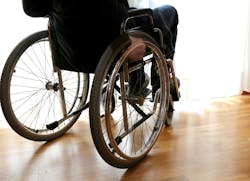Robert Amar is among the first Houston Methodist Amyotrophic Lateral Sclerosis (ALS) patients enrolled in a research study designed to provide a multidisciplinary standard of care to those whose disease has rendered them homebound.
Supported by Dr. Ericka Greene and the multidisciplinary ALS team at Houston Methodist, Dr. Keelie Denson designed a study, “Caring for the Homebound Patient with ALS,” that is following 24 patients and an optional 24 caregivers for 16 months. Patients live within 50 miles of Houston and can’t physically visit their neurology team any longer, maybe because they’re too weak and on a ventilator or they don’t have transportation, lack access to technology or have financial hardship. For one reason or another, they’ve missed one or more clinic visits and are basically on their own in the final stages of their disease.
Half the patients – the control group – will receive telehealth visits with a neurologist. The other half – the intervention group – will get quarterly home visits from a neurologist and a social worker, accompanied by a live video conference that includes physical and occupational therapists, a dietitian, a speech therapist, and a medical equipment expert.
Before each visit and at the end of the study, patients and caregivers will complete the gold standard quality of life surveys that will provide data to prove or disprove the theory that multidisciplinary home healthcare visits improve life for these ALS patients.
Early in the study planning stage, Dr. Denson questioned her ALS families about what they found lacking in ALS care. For the Amar family, the answer was easy: “Hands-on care for our loved ones,” Angela recalls. As her husband’s disease progressed, getting him to the ALS Clinic and other appointments became a monumental struggle. For Robert, leaving home was becoming impossible. It is also very difficult to find caregivers and nurses experienced in caring for someone on a ventilator, feeding tube dependent, non-verbal and paralyzed.
Dr. Denson’s presentation of the ALS home care study generated considerable enthusiasm at an ALS symposium in Switzerland last year, and results will be compiled into a formal report following the 16-month trial.

